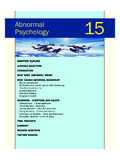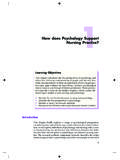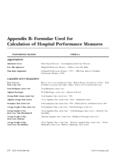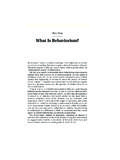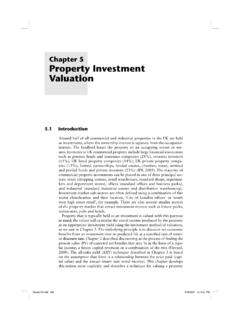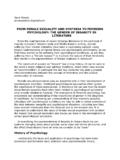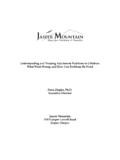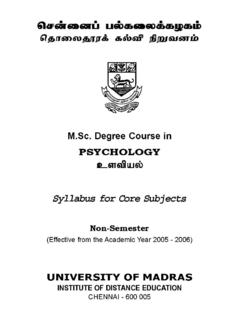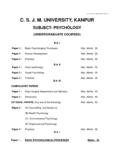Transcription of The Science of Psychology 1 - Wiley-Blackwell
1 1/2/05 3:17 pm Page 2. The Science of Psychology 1. CHAPTER OUTLINE. LEARNING OBJECTIVES. INTRODUCTION. PINNING DOWN Psychology . Psychology AND COMMON SENSE: THE GRANDMOTHER CHALLENGE. Putting common sense to the test Explaining human behaviour THE BEGINNINGS OF MODERN Psychology . Philosophical influences Physiological influences Psychology TODAY. Structuralism: mental chemistry Functionalism: mental accomplishment Behaviourism: a totally objective Psychology Gestalt Psychology : making connections Out of school: the independents The cognitive revolution FINAL THOUGHTS. SUMMARY. REVISION QUESTIONS. FURTHER READING. 1/2/05 3:17 pm Page 3. Learning Objectives By the end of this chapter you should appreciate that: n Psychology is much more than common sense';. n psychological knowledge can be usefully applied in many different professions and walks of life .
2 N Psychology emerged as a distinct discipline around 150 years ago, from its roots in physiology, physics and philosophy;. n there are fundamental differences between different schools of thought in Psychology ;. n Psychology is the Science of mental life and behaviour, and different schools of thought within Psychology place differing degrees of emphasis on understanding these different elements of Psychology ;. n most academic departments in the English-speaking world focus on the teaching of experimental Psychology , in which scientific evidence about the structure and function of the mind and behaviour accumulates through the execution of empirical investigations;. n in the history of Psychology many different metaphors have been used for thinking about the workings of the human mind, and since the Second World War the most influential of these metaphors has been another complex information-processing device the computer.
3 INTRODUCTION. Psychology is often defined as the Science of But does this expanded definition cover the behaviour'. Certainly, psychologists invest a con- wide range of phenomena studied by psycholo- siderable amount of time and effort in observing gists including topics you might not expect and measuring behaviour. But they are also inter- to find in a Psychology textbook, like thirst, vision ested in what people say about their experiences. and hearing (chapters 5, 7 and 8)? Rather than studying a person's behaviour in iso- Ask yourself: Who am I?' You might mention lation, they use the behaviour to find out about many aspects of yourself when you answer this mental and biological processes, motives and per- question, including your personality, your experi- sonality traits. Therefore a definition of Psychology ences, your sexual preferences, age, physical as the Science of behaviour' is inadequate.
4 Characteristics, aspirations, attitudes, social con- So, what is Psychology ? One way to answer this tacts and so on. All of these are of interest to psy- question is to start with the word itself. Psycho- chologists (see chapters 10, 14 and 17). As if logy' literally means Science of the mind' (psycho this were not enough, they would also be inter- meaning mind', or mental', and -logy meaning ested in things that you are unlikely to mention, Science '). A better definition of Psychology might like your physiology (especially processes in your be the Science of behaviour and mental pro- nervous system), genetic make-up, and mental cesses', and indeed this is the definition offered processes that are outside your conscious aware- in most introductory Psychology textbooks. ness (see chapters 3, 5 and 7). 1/2/05 3:17 pm Page 4. 4 The Science of Psychology Here is a selection of the many activities that psychologists engage in and the settings in which they do so: n Teaching and developing training pro- grammes (universities, colleges, hospitals, industry, government).
5 N Scientific research (universities, private and government research institutes, industry). n Diagnosis and treatment of emotional and behavioural problems (hospitals, community service agencies, private practice). n Personality testing, vocational testing and test development (personnel departments Figure of organizations, consulting firms). n Advising government on policies (all levels Psychologists engage in a wide range of activities, including helping athletes to improve their performance. of government). n Diagnosis and treatment of learning difficult- ies, emotional and behavioural problems that impair education (nurseries, schools, special education units, universities). n Designing machines, computers, systems ( Given this diversity of activities it should be assembly lines), traffic signs etc. that are no surprise that it is impossible to identify a optimal for human use (industry, government) common set of characteristics (or even a single n Providing expertise to the legal system characteristic) that sets psychologists apart from (prisons, courts, consulting firms) sociologists, anthropologists, biologists and so n Developing advertising and marketing strat- on.
6 What does this mean for you, as you begin egies (business) your study of Psychology ? It means that the sub- n Helping athletes improve performance (pro- ject you have chosen to explore is more complex fessional sports teams, government sports than it might appear at first sight which makes institutes) it all the more fascinating. and behaviour/mind, cognit- PINNING DOWN Psychology cognitive Psychology examines ive Psychology looks at basic fundamental mental processes such as mental processes, and so on. perception, thinking, memory, To begin with, Psychology Here is a list of the many sub- developmental Psychology the study language is not a single enterprise. fields of Psychology : of age-related changes across the life Rather, it is a coalition of span specialities, each identified Abnormal Psychology : Nature and development of abnormal by the adjective that precedes behaviour, thoughts, feelings associated with distress or the word Psychology '.
7 So, impaired functioning that is not a culturally expected clinical Psychology focuses on the for example, developmental response to an event (see chapter 15). causes and treatment of psychological Psychology encompasses age- Behaviour genetics: Impact of heredity on animal and human disorders and adjustment problems related changes across the behaviour (see chapter 13). such as depression and phobias lifespan, clinical Psychology Clinical Psychology : Diagnosis, treatment, and prevention of focuses on the causes and mental disorders and disabilities (see chapters 14, 15 and 16). treatment of psychological Cognitive neuroscience: Neuronal basis of mental processes disorders and adjustment (see chapter 3). physiological Psychology investig- problems, physiological psy- Cognitive Psychology : Study of the processes by which ates the association between the brain chology investigates the asso- sensory information is transformed, reduced, elaborated, and behaviour ciation between physiology stored, retrieved and used (see chapters 8, 11 and 12).
8 1/2/05 3:17 pm Page 5. Pinning down Psychology 5. Community Psychology : Person environment interactions Neuropsychology: Study of the impact of disorders of the and the ways society impacts upon individual and commun- nervous system (especially the brain) on behaviour (see ity functioning. Focuses on social issues, social institutions, chapters 3, 5 and 7). and other settings that influence individuals, groups, and Organizational Psychology : Study of structures and functions organizations. Emphasizes changing social systems to pre- of organizations and the activities of the people within vent psychological problems (see chapters 17, 18 and 19) them. Included in its remit are job satisfaction, employee Comparative Psychology : The study of behaviour in different attitudes and motivation, and their effects on absenteeism, species (see chapters 3, 4 and 5) labour turnover, and organizational productivity and Consumer Psychology : The effects of advertising, marketing, efficiency (see chapter 20).
9 Packaging, and display on the behaviour of purchasers (see Personality Psychology /Individual Differences: Study of char- chapter 17) acteristics that make each person unique (see chapter 14). Counselling Psychology : Traditionally associated with the field Social Psychology : Investigation of the reciprocal influence of of education, counselling Psychology may include voca- the individual and his or her social context (see chapters 17, tional guidance as well as helping persons resolve problems 18 and 20). or role issues related to work or school or family matters Sport/exercise Psychology : Reciprocal effects of psychological (see chapter 16) factors on sports/exercise Cross-cultural Psychology : Impact of culture on human behaviour (see chapters 13 and 18) The numerous specialities make Psychology a wide-reaching sub- Developmental Psychology : Change in behavioural and ject with rather fuzzy boundaries.
10 So, you may well ask, What is mental processes over the life span (see chapters 9 and 10) the glue that holds Psychology together as a discipline?'. Developmental psychopathology: The origins and course of If there is any one thing, it individual patterns of behavioural maladaptation whatever is Psychology 's reliance on a empiricism the belief that knowledge the age of onset, causes or transformations in behavioural philosophical view known as comes from observation and experience, manifestation (see chapter 15) empiricism. Empiricists believe and sensory experience is the source of Educational Psychology (also called school Psychology ): that knowledge comes from all knowledge Diagnosis and treatment of educational, emotional, and observation and experience behavioural problems in children and teenagers (see chap- (the Greek empeiria literally ters 9 and 10) means experience').
